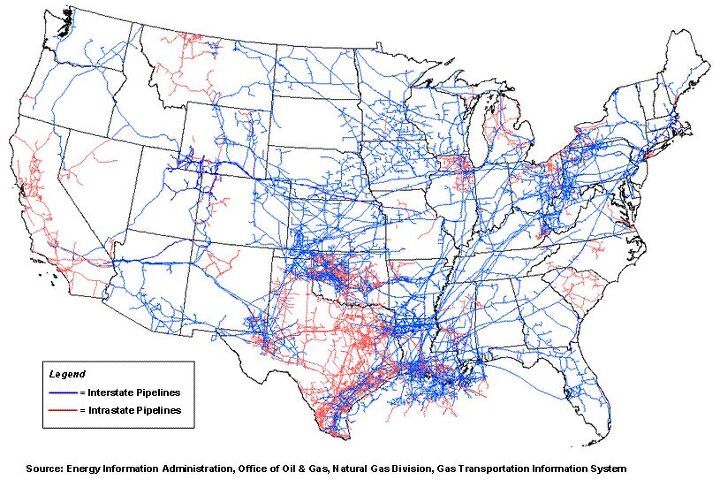Jalopnik Brain Farts On Natural Gas Pipelines

It’s not that uncommon for a writer to make a mistake. You’re in the flow of the moment, tapping out stylish bon mots with just the right balance of serious and snark and it sounds right so you don’t bother to research the point and you later find out in the comments section that you made a factual error. It’s usually much more than that, but an 800 word post on a car blog is not a treatise written with graduate school levels of footnotes and citations, so mistakes get made and I’m hardly blameless in that regard. Still, sometimes you gotta call a mistake a mistake, and Jalopnik made a whopper.
Ben makes the legitimate argument that there are many costs to extracting natural gas, financial and environmental, that are not immediately obvious. The extractive industries use a great deal of water and producing fossil fuel has its own carbon footprint. Preston goes on to argue that one hidden cost and environmental impact of drilling for natural gas is that America lacks pipelines to get the gas to market.
[Extracting natural gas] uses a lot of water, and with no pipeline infrastructure, transportation costs money and adds to air pollution.
When I first read that, I thought, “What do you mean, no pipeline infrastructure? There’s a gas line to my furnace!” Upon second thought, though, I considered that Preston might have meant that there were no pipelines for carrying needed water to the wells. Farther down in his piece, however, Preston makes it clear that my first impression was accurate. Those increased air pollution and transportation costs are supposedly the result of needing to use tanker trucks to move the gas from the wellhead to consumers.
As it stands now, most natural gas is transported by tanker trucks — a lot of tanker trucks.
I realize that most website editors don’t do a lot of fact checking, but don’t any of the Jalopnik editors ever cook with gas? Do none of them have a natural gas fired furnace heating their homes? Have they never seen a natural gas well in a rural area? Does Ben Preston really think that most natural gas is transported by trucks and that we don’t have an infrastructure of pipes that carry gas from the well to consumers? Does he think there’s a constant stream of tanker trucks queuing up to every natural gas well in America?
Regarding our supposed lack of a pipeline infrastructure, an image search on “ natural gas pipelines” yielded a variety of maps of the interstate and intrastate pipeline networks that crisscross the United States.
Sure looks like a pipeline infrastructure to me.
As for Preston’s contention that “most natural gas is transported by tanker trucks”, again that’s simply not true. Don’t take my word for it, take the word of Ed Tucker, who runs Tucker Gas Processing Equipment, which, among other services, will transport natural gas via trucks. TGPE’s website explains when that makes sense:
Many sources of natural gas are shut-in and abandoned because the economics simply do not justify their development. In some cases, access to public transmission lines may be limited by distance or local geography. In other cases, the need for additional processing to bring the gas up to pipeline quality standards may be a factor. While many industrial applications can utilize gas that does not meet these strict standards, the distance to the nearest such industrial consumer may not justify the cost of laying a direct pipeline. In such cases, transporting the gas by truck may provide a solution.
When I asked TGPE what percentage of US natural gas is transported to market via trucks, Ed Tucker told me (emphasis added):
The answer would be next to none. The CNG trailers in the US are used primarily to transport gas from one place to another when they are repairing a pipeline and have to shut down a line for a few hours. Some years ago we had two small projects transporting from small gas fields. We had an inquiry from Vermont earlier this year where they wanted to substitute CNG for propane since there were no pipelines and the ratio of cost for propane was $28 per one million Btu versus pipeline gas at $2.50 per one million Btu.
Had Preston’s remarks about there being no natural gas pipeline infrastructure been restricted to newly developed wells, that might have been more accurate. However, based on what Tucker told me about how little gas is actually trucked, I think it’s safe to assume that the developers of any new natural gas wells include hooking them up to the existing pipeline system as part of the installation of those wells. In addition to dedicated natural gas wells, natural gas can also be a byproduct of extracting petroleum. Tucker pointed out that in the Williston Basin (under Montana, the Dakotas, and Saskatchewan), oil producers that aren’t serviced by gas pipelines will flare off the natural gas they produce rather than truck it and sell it. The cost of trucking it to a processing or gas sweetening plant is just not cost effective, particularly at a time when natural gas prices are low.
So, contrary to what Jalopnik says, there are thousands of miles of natural gas pipeline infrastructure in the US and no, there aren’t “a lot of tanker trucks” used to move gas from wellhead to your stove, furnace, or even a natural gas vehicle refueling device.
Ronnie Schreiber edits Cars In Depth, a realistic perspective on cars & car culture and the original 3D car site. If you found this post worthwhile, you can dig deeper at Cars In Depth. If the 3D thing freaks you out, don’t worry, all the photo and video players in use at the site have mono options. Thanks for reading – RJS

Ronnie Schreiber edits Cars In Depth, the original 3D car site.
More by Ronnie Schreiber
Latest Car Reviews
Read moreLatest Product Reviews
Read moreRecent Comments
- MaintenanceCosts 308/311 is just the rating of the gas engine by itself. The full powertrain power rating, taking into account both power sources is 483/479. The car will do 0-60 in under five seconds. Frankly, I find the idea of that being "underpowered" bizarre.Also, "understated" has never been less fashionable within my lifetime. We are in a moment where everyone wants to make a Bold Statement with everything they do.
- 28-Cars-Later @PoskySo here's some interesting data, Manheim's Used Car index is still 28% higher than shortly before the Plandemic (155 on chart) after declining from a height of 39% (roughly 215) in January 2022, yet interest rates are now more than double on average. Maybe the White House should focus on some deflationomics instead of mucking up everything?
- Dale Had one. The only car I ever bought because of a review in a guitar magazine.Sure was roomy inside for such a small car. Super practical. Not much fun to drive even with a manual.Sent it to college with my stepson where it got sideswiped. Later he traded it in on an F-150.
- Bd2 Hyundai's designs are indeed among the most innovative and their battery technologies should allow class leading fuel consumption. Smartstream hybrids are extremely reliable.
- 28-Cars-Later So now H/K motors will last longer in between scheduled replacements. Wow, actual progress.




































Comments
Join the conversation
I'm amazed at how many people are totally unaware of how things work. I got into an argument with a coworker years ago. He insisted that almost all gasoline was shipped around the country by truck. I laughed at him and he got very upset about it. This was in the dial up internet days and I finally found a map of the pipeline system and he was totally freaked out that all that gas, along with crude oil, natural gas, and propane were being piped all over the area, including right down the street from his home! There was a huge fire in San Bernardino, Cal, in 1990 of a "petroleum pipeline" that exploded after a train wreck. Here is the show they made about it. What a disaster: http://www.youtube.com/watch?v=iW2KSTkHuA8
how is this for natural gas issues. a former employee now works in the north dakota oil fields. this is the fastest growing oil producing area in the lower 48. ALL of this oil is shipped via truck to a loading station or refinery as there is not an adequate pipeline network to move the material. and the natural gas that is found along with the oil? burned off at the source of the well. 24-7.